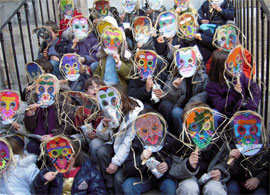La Maîtresse
My children go to Hogwarts. You wouldn’t think so just looking at the primary school building, a fairly nondescript 20th century construction. But just across the street, adjacent to the courtyard where children clamor uncontrollably during the récré, there’s an imposing, majestic building that  houses the school’s cantine and the classrooms for the older students. Classified as historic by the city of Paris, it screams of Hogwarts. Standing before it at dusk on a blustery autumn evening, its façade is severe and intimidating; Harry Potter could easily be sweeping by you in his invisibility cloak, escaping the punitive snarl of Professor Snape.
houses the school’s cantine and the classrooms for the older students. Classified as historic by the city of Paris, it screams of Hogwarts. Standing before it at dusk on a blustery autumn evening, its façade is severe and intimidating; Harry Potter could easily be sweeping by you in his invisibility cloak, escaping the punitive snarl of Professor Snape.
France’s education system is known for its severe and intimidating structure, one that places academic performance above things extracurricular or social. Short-pants and Buddy-roo’s school feels particularly rigorous; they have homework every night, the book-bags that they carry home each day weigh as much as they do, they are tested often and their class ranking is public.
I have the sinking feeling that the girls have learned far too early to see mistakes as something to fear rather than to learn from. At the same time, they are getting a solid education. I’ve heard too many troubling stories about US schools passing students just to move them along. That won’t be happening here, at least not at our beloved Hogwarts.
This stern ambiance is palliated somewhat by their participation in the English section, led by two creative and ambitious teachers who also care about the learning climate and the community. They invite feedback, they ask us to help plan a Halloween party or a holiday celebration so that the kids get a feeling about the culture, not just the structure of their parents’ language. The English teachers are accessible and willing to engage easily with parents. They even use email. How modern.
This is a stark contrast to many of the French teachers in the school, in particular the new teacher assigned to Buddy-roo’s class, whom I’m call Madame Deville. She’s replacing a teacher who was a bit of a cold fish, so when we first saw that there was a new, younger teacher, many parents rejoiced. Not for long. The homework assignments those first days were barely cloaked barbs at the adults for not assembling the full complement of school supplies or turning in the paperwork in a timely fashion. The homework the next week was daunting, with explicit and rather complicated instructions about which cahier and in what order to learn twenty random words that appeared to have little in common, plus the “house of 10” multiplication table and also this week’s poem to illustrate and memorize so that it can be recited in front of the class. To a second grade child who’s all of a sudden terrified of making a mistake, this is overwhelming.

Just getting Buddy-roo to sit down and concentrate has always been a bit tricky, but now there is a particular angoisse to her procrastination. She constantly has a reason to interrupt her work; to sharpen and re-sharpen her pencil or get the right pen or re-arrange her papers or to double check the cahier for the length of the assignment or get a drink of water. I know nagging will not help and I don’t want to add to her stress, but my best efforts to remain cheerful and encouraging have already been stretched to the max. Make it fun, I keep telling myself, inventing a game to inspire her to put those words in alphabetical order. But who am I kidding? That’s not her idea of fun. Not for hours every night.
(The other night at a neighborhood bar, a friend of ours who’s son is also in Buddy-roo’s class performed an hysterical monologue demonstrating how he’s ready to hang himself after helping his 7-year-old son do homework for two hours one night. We’re not the only ones who are suffering.)
I don’t expect Buddy-roo to display a seamless scholastic-competence at the young age of seven. But I do want to help her avoid getting stereotyped in an education system where your reputation gets cemented rather early, where teachers are inclined to point out your weaknesses and hold you to them. It makes me wonder if this school is right for her, for both of them. But if not here, where? Where can they get this rich bilingual, bicultural experience and strong academics plus the social and emotional support?
Does any school offer all that? Any school we can afford, that is?
At the class meeting, Madame Deville counseled the assembled parents complaining about the homework to set their worries aside, citing a French law that states it is illegal to force school children of this age do written homework. The children won’t be graded on their homework, she assured them. But if they don’t do the homework, will they be able to keep up in class? She shrugged.
Unfortunately I couldn’t make that meeting – I was away on business – but I feel as if I was there because it has become the talk of the school, especially this particular moment: “Veuillez avoir de la bienveillance,” Madame Deville scolded, warning that when notes in the cahier de correspondance don’t use the formal French politesse, our “aggressive words” put her in a bad mood and she’ll it take out on our children. Stunned parents are still hashing this over as they cluster together at morning coffee klatches and the afternoon sortie d’école. One father asked me if I thought this meant that if he wasn’t polite enough it would cause the teacher to be more punitive to his son in particular, or to the class in general? In general, one hopes. But no-one is sure. Everyone is reeling from this.

De-facto, bless his soul, steps empathetically into her shoes and reminds me how much we dreaded hosting a dozen kids for not even three hours at Short-pants’ birthday party. It’s not an easy job to spend the entire day, every day, with 31 young children. If she receives a scribbled, annoyed note from even a handful of the parents on any given day, that would certainly put her in a bad mood and impact her ability to tolerate the antics of the children. He has a point, I suppose, but I don’t think it calls for a pronouncement to the parents in such a finger-wagging way.
I should go on record: not all the French teachers at Hogwarts are so persnickety. Buddy-roo’s teacher last year was absolutely lovely. At a meeting this week, Short-pants’ teacher praised the class and told us she wouldn’t test the children on their reading assignments because she wanted them to experience reading as something one does for pleasure. So they’re not all prickly.
I am attempting, against the tide of tirades about Madame Deville, to keep my mind open. I cautiously address her each time I write a note in the cahier de correspondance (she mandated the parents, at the aforementioned meeting, to use her surname; the salutation of “Madame,” without her last name was insufficient). I use all the little flowery phrases from my book about how to write French letters. It’s already a challenge for Buddy-roo to like school. She doesn’t need an overzealous schoolmarm bearing down on her because her mother is too proud to play along.
Last week I politely requested a private meeting with the Madame Deville; I have been granted a ½-hour appointment with her next Thursday morning before school starts. I’m eager to see her close up. Is she the wicked witch of Hogwarts-Paris as everyone has begun to believe? Or is she just trying to get her “I-may-be-young-but-I’m-strict” stake in the ground so she doesn’t get pushed around? That’s what I hope to find out.
Any tips on a good strategy for this meeting?